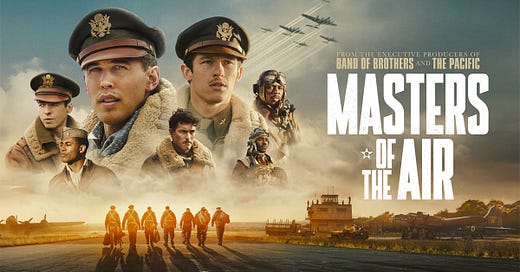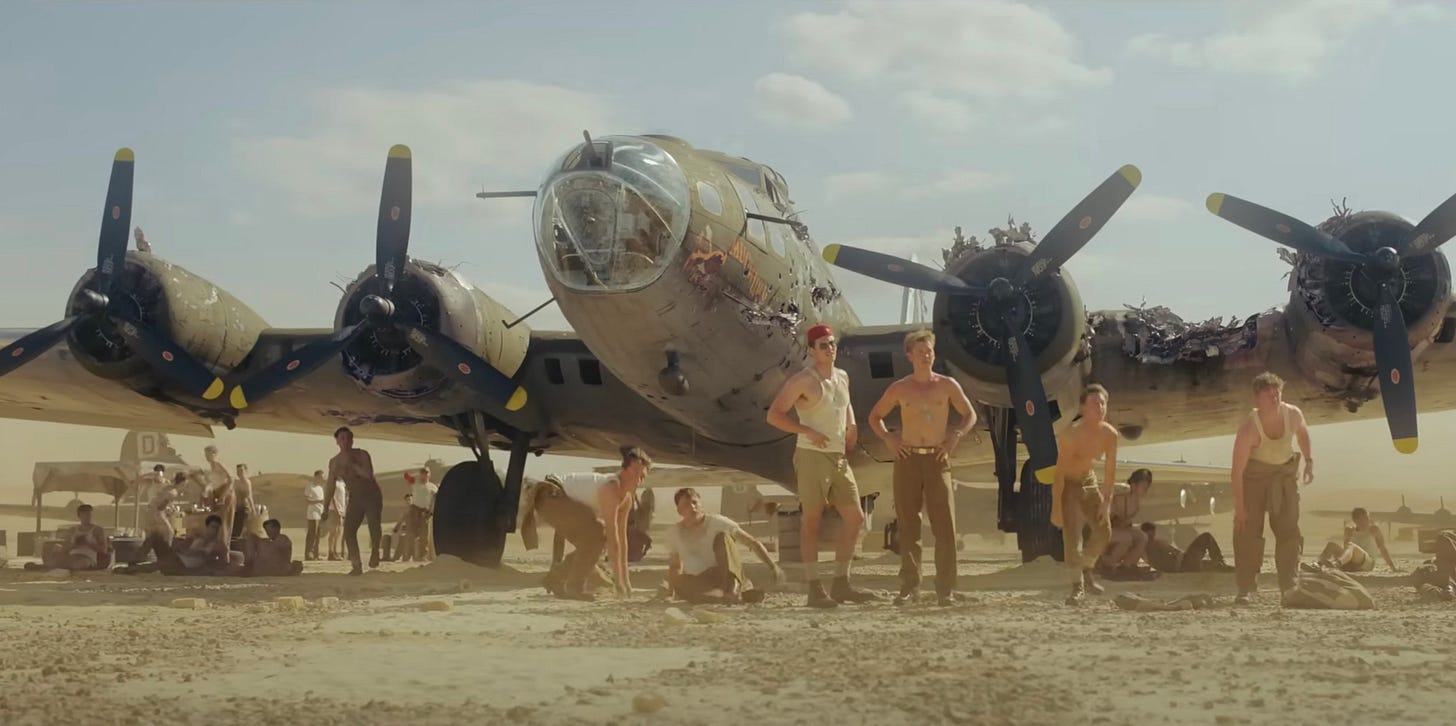Why doesn't Masters of the Air work?
Stories about bombers may be inherently claustrophobic and repetitive
Comancheria Season 3 coming out next week.
The original Band of Brothers follows the American 101st Airborne division through training, the Normandy invasion, and their fight all the way to Hitler’s Eagle’s Nest and to Allied victory. It’s one of the greatest seasons of television ever produced.
Its successor The Pacific is very different: grim and nihilistic, as American boys break against a relentless Japanese enemy on craggy specks across the Pacific Ocean.
Masters of the Air, the third in the trilogy, is something different again. It’s gorgeous, with its handsome pilots in bomber jackets, quiffs and aviators (jarringly complete with aggressive lip fillers). The handsome protagonists are majors by the end of the first episode. We don’t see them earn their stripes. They’re born cool, with their good looks and repartee. Elvis of the skies.
But that’s it. While there’s plenty of death and blood on screen, there’s no blood in the veins. It’s all sizzle and no sausage, an extended Abercrombie & Fitch ad for American bombers and their annihilation of German cities.
Why?
Maybe it’s just hard to make great work. Beautiful and meaningful and gripping and well-paced and perfectly cast like Band of Brothers is a really high bar.
But I wonder if there’s something to the inherent structures of the different stories the three seasons are trying to tell.
The story of the 101st Airborne in Band of Brothers is, in the end, aspirational. A group of ordinary boys bond beneath a great leader and do extraordinary things. What they do matters. We see that as they progress from the terrifying landings at Normandy through to the frozen killing fields of France and beyond. They face their share of brutality and derangement. Good strong men crack. But ultimately we love Major Winters and his men. Defeating Germans and liberating Landsberg concentration camp, they are our Good Men who triumph over Evil. It is the epic origin story of the modern American empire.
The Pacific is different. There is no progress, there is only death. What are these boys doing out in the Pacific? The Japanese menace is incomprehensible and relentless. Boys are cut down and fever riddled in a cursed and hot and craggy hell. They return broken, disillusioned. But what else could the story in the Pacific theatre say? What happy ending was there? Japanese atrocities and heavy American casualties. Bombers firebombed Japanese cities into oblivion, culminating in the two nukes dropped on civilian centres for there was nothing else left to destroy. What aspirational happy ending is there in bombers flying back from raids wrenching from the smell of burning human flesh? The bravery and heroism and righteousness of these men may be no less, but it’s a different, tougher story.
Masters of the Air is about exactly that: bombers (the real life ‘Bloody’ 100th Bomb Group so named for, well, its bloodiness). And maybe that’s its issue. What is the story you can tell of men whose job it is to fly over enemy territory, drop bombs, return and repeat. There is definitely a story you can tell, but it’s not one of progress and comradery. It’s one of dancing with death. The freezing high-altitude cold. The atrocious meat-grinder attrition rates. Each episode is a bottle episode: inside the base, inside the plane. There is a claustrophobic madness to it. Every flight a roll of the dice. Good chance you won’t return. You probably hit nothing, and if you hit something it’s probably civilian. Although it did get better and American sights were more precise than the British, initially Allied bombing was horribly inaccurate:
49% of bombs dropped between May 1940 and May 1941 fell in open country... only about 5% of bombers setting out bombed within 5 mi (8.0km) of the target
(The Second World War by Antony Beevor)
Hence the deranged satirical style of the classic of the genre, Catch 22.
Astute readers might stop me here and accuse me of recently asking for a film about Australia’s air war over New Guinea during WWII and they’d be exactly right. I’d argue that story isn’t focused on bombers but rather defensive fighter pilots and there are other sub-plots that drive the story forward. (Also a 1.5 hour film isn’t a 9 hour TV series). Maybe that’s right or wrong, but even if I’m wrong that storytelling about bombers is structurally different, Masters of the Air just doesn’t work anyway.
There are only so many ways to show guys dropping bombs and avoiding fighter planes and exploding in flak and being anxiety ridden back on base. To break out of this, the show becomes an everything soup. It devolves into a kaleidoscope of vignettes and morality tales. Black pilot racial struggles. Spies behind the lines. One lover turns out to be working for the French Resistance (forever capitalised in the American imagination). It half-asses the return of some downed pilots. There’s a Great Escape plot that goes nowhere, except for one of our heroes smacking walls and going a little loopy. Our heroes toy with the idea of making a run for it but almost never manage to — they end up going along with the Germans with guns (some do, eventually, escape). Which might be a powerful repudiation of the ‘sheep to slaughter’ critique of murdered Jews, but it makes for some dull viewing.
Some excruciating moralising follows the focus on the black pilots of the Tuskegee Airmen. Asked by a Nazi camp officer how he could fight for a country that treats him as it does, a black pilot responds that America is doing its best to become the nation it was meant to be. I mean, he may as well have stared into the camera and begun singing the American national anthem. (In one bizarre and unintentionally (?) hilarious scene the African American pilots bump into African African POWs and recognise themselves in one another.)
The series finale is a tour through the underworld. Our POW heroes go on a death march to Nuremberg, a city reduced to rubble. Another downed hero — a true story Jew pilot who actually did fly a shockingly high 52 bombing missions, more than anyone else in the 100th — happens to walk through a death camp. And — ta da! — we understand why Nuremberg is in rubble. Charred, emaciated bodies. Bodies shot, starved or strung up. Still too subtle, our hero finds marks scratched into a wall — a menorah, Stars of David, Hebrew writing. A death camp for Poles, Russians — but mainly Jews, we are told. An old lone survivor he then meets tells him about the Jews — his family among them — shot en masse into ditches (incidentally, how my great-grandparents were murdered). Where will he go now? Palestine, he says, hinting at a distant hope. But hope is scarce and God is gone from this tour through the underworld — if there is a God, he has forgotten them, the old man says.1
It’s all a bit of an afterthought. Death camps for Jews, mass graves for Jews, the promise of Israel. It’s a surprise to no one, and a discordant departure from the action in the air. We’re down here at the coal face of hell because the show got bored of the skies. We pretend to care about the moral question that’s forced on us about as subtly as rouge on a street whore. One of our heroes belts out this Nietzsche quote he happened to memorise in college:
Whoever fights monsters should see to it that in the process he does not become a monster. And if you gaze long enough into an abyss, the abyss will gaze back into you.
The Jewish pilot who wandered through the death camp is not having it. We had to do it, there’s no other way, he says. Unapologetic and clear-eyed, this is the ultimate stance of this glitzy American war show.
So the bombing of German cities to oblivion is validated. Don’t think about it too much. Our bombers are heroes and the Germans had it coming. I suppose in the current climate we should be thankful for this saccharine brand of patriotism, although nothing less is expected from the blue-chip all-American boys who back the series (Tom Hanks, Steven Spielberg). Just don’t mention Gaza!
There are more bizarre episodes of moralising. Our American guides through the underworld are oddly pure. A Jewish American POW catches and supports an SS officer as he collapses in the cold. Escapee America POWs spare the lives of adolescent German soldiers who kill their friend and who try to kill them. There is an otherworldliness about our guides. Too beautiful and naïve, creatures of the air, they are angelic. They are Orpheus as he descends into Hades. They are not really a part of the horrors they walk us through.
Masters of the Air probably does have the best air battles on screen, at least that I’ve seen, and for that alone it’s worth watching. If you want to watch a slick projection of modern fantasy to wars past — lip filler and perfect hair, brought to you by Abercrombie & Fitch — look no further.
PS. If you Google ‘quiff’ our aviator hero Elvis is the very internet definition of the cut:
Reminds me of something Harold Bloom once wrote:
I myself love the Tanakh or Hebrew Bible more than I possibly could care for Yahweh, since he has not kept his Covenant with us, whoever we are.








I watched one episode and turned off - implicitly agreeing with almost all your points.
More than this I was struck by how unsatisfying in every sense it was compared to the 1949 movie “Twelve o’clock high”.
https://www.imdb.com/title/tt0041996/?ref_=ext_shr_lnk
I like the blog, but I disagree with your overall take on the series.
*In the past decade where everything was a shade of gray, this appreciates the war was closer to black and white.
*Even saying that, the show provides shades of gray. Why did the military send some of these pilots on suicide missions for almost no benefit? Why were the Black pilots screwed with fuel supplies for one run?
*Even the German-American distinction shows some shades of gray. They discuss how their bombs hit civilian targets, and how the area around one bomb run will kill a lot of civilians. They also show the vitriol the German public has for the Americans--which shows there were actual people getting bombed.
Yes, it is an air show that's not entirely in the air, but Band of Brothers spends a lot of time on personalities and humanity, not just Lt. Winters killing people. Same deal here.
I thought this was a triumph.